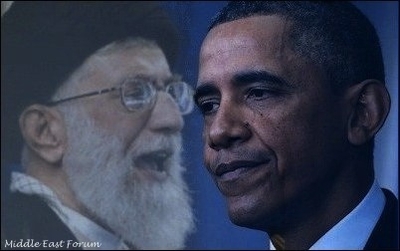Why Obama is wrong on Iran
Majid Rafizadeh/Al Arabiya
Friday, 1 May 2015
President Obama has put all of his eggs in one basket, concentrating on Iran’s nuclear file and spending a considerable amount of political capital on this issue in the past two years.
His main view of the Islamic Republic can be primarily characterized as one-dimensional- that is analyzing Iran from solely the prism of its nuclear program. On the other hand, Iranian leaders have a more multi-faceted, subtle, complicated multi-dimensional view of their role in the Middle East and of their relationship with the U.S. and the West.
Spending too much political capital on Iran’s nuclear file and ignoring other threats imposed by Iran’s military will neither completely contain the Iranian nuclear threat, nor moderate Iran’s expansionist foreign policies
Majid Rafizadeh
Obama’s key reasons behind his one-sided perspective are obvious. First and foremost, he would like to leave a historic record and lifetime legacy of being the first American president who reached a nuclear deal with longtime foe, the Islamic Republic. This is similar to the historic Nixon China agreement and Nixon-Mao handshake, which began a new period of Chinese-American relations.
But, President Obama is wrong on Iran from various landscapes.
Crucial issues that Obama is ignoring
While the nuclear threat of Iran is a serious matter for regional stability, nevertheless, spending too much political capital on Iran’s nuclear file and ignoring other threats imposed by Iran’s military will neither completely contain the Iranian nuclear threat, nor moderate Iran’s expansionist foreign policies in the region.
On the contrary, as the latest developments in the Middle East have revealed, viewing Tehran only from the prism of nuclear proliferation will assist Iranian leaders and senior officials of Iran’s Revolutionary Guard Corps (IRGC) to be more emboldened in extending their geopolitical and military influence in the Middle East.
Currently, Iranian leaders are attempting to push for an agenda that claims the world view of Tehran from the prism of nuclear negotiations rather than of its regional policies. This strategy falls right into the interest of Supreme Leader Ayatollah Ali Khamenei and Iran’s army establishments.
In order to achieve the aforementioned primary objective, while removing the pressure and concerns from other countries and allies, President Obama’s second argument appears to be that a focus on Iran’s nuclear file will open avenues to address and negotiate other crucial matters with the Iranian leaders which are linked to Middle Eastern geopolitics, the economy, American national interests and strategic landscapes.
Iran’s foreign policy in the Middle East is complex
Notwithstanding, the other issue that President Obama has failed to recognize is that even if a nuclear deal is reached, the Islamic Republic’s regional hegemonic ambitions will not fundamentally be altered partially due to the ideological tenet of Iran’s foreign policy.
While many nation-states’ foreign policies operate on the three crucial realms of geopolitical, economic, and national interests, the Islamic Republic’s foreign policy, the supreme leader and the IRGC cadres’ major objectives hold a fourth critical and indispensable landscape: ideological principles and ideals.
Over the last three decades, the Islamic Republic has cemented and ossified its complicated role in the region through its main foreign policy pillar: the ideological, sectarian, and revolutionary ideals.
For example, Iran’s support for the ruling Shiite coalition in Iraq, its backing of Hezbollah, the Syrian government, and the Houthis in Yemen, along with Tehran’s recruitment of foreign Shiite fighters to fight in Syria or other countries, are not solely for geopolitical or strategic reasons.
These intricate alliance are entrenched in Islamic revolutionary ideals and values, such as promoting Shiism (the fundamental core of the Islamic Republic), opposing the Great Satan, and extending the Persian influence in the Middle East.
As long as these ideological ideals, principles, the concept of a supreme leader, Velayat-e-Faqih, and the underlying political establishment of the Islamic Republic exist, Tehran will not simply remove the ideological principle from its foreign policy objectives.
President Obama, and many others who believe resolving Iran’s nuclear threat will alter the Islamic Republic’s expansionist policies, view Iran through the prisms of geopolitical, economic, and national interests. As a result, they argue that if Iran is offered economic incentives (such as removal of the UNSC sanctions), Iranian leaders will moderate their regional policies and new venues will be found to make diplomatic headway with Tehran.
In other words, they believe an Iran without sanctions will definitely change its behavior for the better and act more rationally. Nevertheless, the economic incentives offered to the Islamic Republic will most likely be utilized to extend Tehran’s regional hegemonic ambitions.
In closing, as long as one crucial pillar of Iran’s foreign policy remains to be ideological, Iranian leaders will not change their regional ambitions, sectarian agenda, revolutionary principles, or be less assertive in extending their military influence in the region.



















